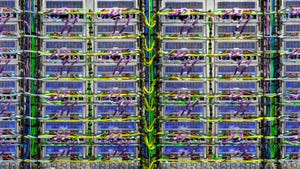VMware to Unleash Kubernetes-Native vSphere on Data Centers in October
The company has also announced four flavors of Tanzu and updated Cloud Foundation and vSAN.

VMware has spent the past year touting its plans to integrate Kubernetes into vSphere – and now it’s almost ready.
The company on Tuesday announced that it will release a Kubernetes-native version of vSphere within the next six weeks – by October 30 at the latest. The offering will allow enterprise customers to run, deploy, and manage Kubernetes-based containerized apps on vSphere 7, VMware’s flagship server virtualization software.
“Our customers are able to take all the things they love about VMware – our enterprise resiliency, management capabilities, all the tools they’ve learned [to run] traditional VM-based apps – and now they are all inherently available for containers,” Lee Caswell, VP of marketing for VMware’s cloud platform business unit, said in an interview with Data Center Knowledge.
The company also announced new versions of VMware Cloud Foundation, vSAN, and four editions of its Tanzu portfolio of Kubernetes products to help enterprises simplify and accelerate adoption of modern, container-based apps.
VMware first announced Project Pacific, its effort to re-architect vSphere into a Kubernetes-native platform, at the VMworld conference in August 2019. This March, the company said the work of grafting Kubernetes onto vSphere was complete, and that it would release the product, vSphere 7, in May.
The company also at that time announced VMware Cloud Foundation 4 with VMware Tanzu, an integrated software solution for running and managing VM-based and container-based applications across a hybrid cloud environment.
The forthcoming release of vSphere 7 with Tanzu is a big deal, because it brings Kubernetes to the installed base of VMware vSphere customers, analysts say.
The initial Tanzu release with VMware Cloud Foundation is a great product, but the market for it is limited, because it only accounts for a small number of vSphere deployments, said Gary Chen, IDC’s research director of Software-Defined Compute.
VMware Cloud Foundation is an all-in-one software package that combines compute, storage, networking, security, and cloud management services to run applications in both public and private cloud environments. The package, which includes vSphere 7, vSAN 7, vRealize Automation 8, and NSX-T 3, is targeted at customers who need to deploy at scale, and it’s designed mostly for greenfield environments, Caswell said.
“It was only a small number of customers who had Cloud Foundation, or if you were regular vSphere customers, you had to do this whole upgrade to Cloud Foundation, which is not trivial, so the addressable customer base was fairly small,” Chen told DCK.
In contrast, with the upcoming release of the Kubernetes-infused version of vSphere, the entire installed base of vSphere can now take advantage of Kubernetes, he said. According to VMware, hundreds of thousands of customers currently use vSphere to run 70 million-plus workloads.
“This is going to be huge, now that it’s going to be part of vSphere and available to all their customers,” Chen said. “Now you can choose your own storage and networking.”
Four VMware Tanzu Editions
Instead of having to deploy the entire VMware Cloud Foundation set of software, vSphere 7 Update 1 with Tanzu allows enterprise customers to take an a la carte approach, Caswell said.
The Tanzu Basic edition, which includes Kubernetes Grid distribution, allows VMware customers to run Kubernetes as part of their vSphere environment.
“Tanzu Basic is the simplest, fastest way to go and run Kubernetes on vSphere. What that means is you have hypervisor Kubernetes support and everything else you can bring a la carte,” Caswell said. “The networking piece could be open source. For storage you can use an existing SAN array.”
The Tanzu Standard edition, which includes Tanzu Mission Control, allows customers to run and manage Kubernetes across multiple clouds. Both the basic and standard editions will be released sometime this quarter (which ends on October 30), the company said.
VMware plans to release two more Tanzu editions later this year: Tanzu Advanced for organizations implementing DevOps, and Tanzu Enterprise with automation features.
Other VMware Product Updates
VMware plans to release vSphere 7 Update 1, vSAN 7 Update 1, and VMware Cloud Foundation 4.1 with Tanzu by the end of October.
The new versions and improved features include:
vSphere 7 Update 1: Monster VMs that now scale up to 24TB and 768 vCPUs in support of resource-intensive applications, such as in-memory databases, the company said. The company also increased the cluster size it supports by 50 percent, from 64 hosts per cluster to 96 hosts per cluster, Caswell said.
vSAN 7 Update 1: The new version introduces HCI Mesh, a software-based approach that disaggregates compute and storage resources to help customers share capacity across clusters. The new version of vSAN also supports the most common file service protocols through support of the SMB v3 and v2.1 protocols, the company said.
VMware Cloud Foundation 4.1. The new version supports data persistence, allowing it to support stateful services such as object storage and NoSQL databases. In fact, the company announced partnerships with three object store companies: Cloudian, MinIO, and Dell EMC ObjectScale. The company now supports block, file and object storage. “Just like we are consolidating management around traditional VM and Kubernetes-based applications, we are now taking blocks, files, and objects and pulling them all together, so customers can get an all-in-one, if you will,” Caswell said.
The new version of Cloud Foundation allows users to upgrade in parallel across different clusters. It also allows for “skip level upgrades.” That means that if you are on version 3.1 of a software product, for example, you can skip to version 3.3 without having to install version 3.2, Caswell said.
Dell EMC on Tuesday announced that its Dell EMC VxRail hyperconverged infrastructure integrates fully with the VMware Tanzu software portfolio with reference architecture, cluster, and private cloud offerings. Dell EMC’s parent company, Dell Technologies, also owns a controlling stake in VMware, which it has been looking to divest.
About the Author
You May Also Like



.jpg?width=300&auto=webp&quality=80&disable=upscale)





